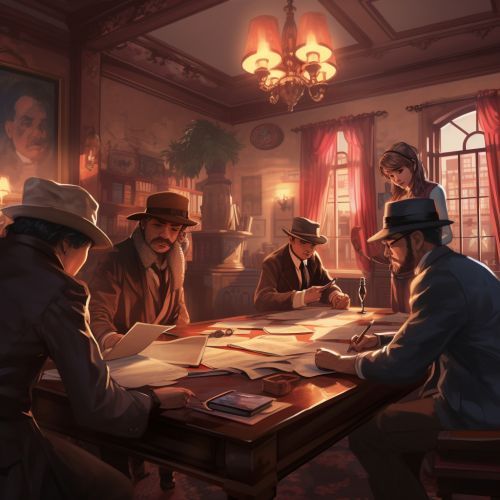Detective Bureau
Overview
The Detective Bureau is a specialized department within a police department that is responsible for the investigation of crimes. Unlike uniformed officers who primarily respond to emergencies and patrol their jurisdictions, detectives work to gather facts and collect evidence for criminal cases. They conduct interviews, examine records, observe the activities of suspects, and participate in raids or arrests. Detectives usually specialize in investigating one type of crime, such as homicide or fraud. They are often assigned cases on a rotating basis and work on them until an arrest and trial are completed or until the case is dropped.


History
The concept of a Detective Bureau has its roots in the early 19th century with the establishment of the first detective force in London, England. The Metropolitan Police Service, established in 1829, was the first modern police force to incorporate a detective branch. The Detective Branch, as it was then known, was established in 1842 following criticism of the police's handling of the investigation into the murder of Lord William Russell. The success of this branch led to the adoption of detective bureaus in police departments around the world.
Roles and Responsibilities
Detectives in a Detective Bureau have a wide range of responsibilities. They are primarily responsible for investigating crimes, which involves gathering and analyzing evidence, interviewing witnesses and suspects, and building a case for prosecution. This often involves working closely with other members of the police department, as well as with other agencies such as the district attorney's office.
In addition to their investigative duties, detectives also have a number of administrative responsibilities. They are required to keep detailed records of their investigations, including notes of interviews, photographs of crime scenes, and reports of laboratory findings. These records are crucial for the successful prosecution of a case, as they form the basis of the evidence presented in court.
Specializations
Detective Bureaus often have a number of specialized units, each focused on a particular type of crime. These can include:
- Homicide Unit: This unit investigates cases of murder and manslaughter. Detectives in this unit are often experienced investigators with a deep understanding of forensic evidence and criminal psychology.
- Fraud Unit: This unit investigates financial crimes, such as fraud, embezzlement, and money laundering. Detectives in this unit often have a background in finance or accounting.
- Narcotics Unit: This unit investigates crimes related to illegal drugs, including trafficking, distribution, and possession. Detectives in this unit often work undercover, infiltrating drug trafficking organizations to gather evidence.
- Sex Crimes Unit: This unit investigates crimes of a sexual nature, including rape, sexual assault, and child abuse. Detectives in this unit often work closely with victims, providing support and guidance throughout the investigative process.
Training and Qualifications
Becoming a detective usually requires several years of experience as a patrol officer. During this time, officers gain a broad understanding of the law, police procedures, and criminal behavior. They also develop the necessary skills for investigative work, such as critical thinking, problem-solving, and communication.
Once they have gained sufficient experience, officers can apply to join the Detective Bureau. This usually involves a competitive selection process, with candidates required to pass written exams, physical fitness tests, and interviews. If successful, they then undergo further training in investigative techniques, forensic science, and criminal law.
Challenges and Criticisms
Detective work is often challenging and stressful. Detectives frequently deal with serious crimes and are exposed to situations of violence and human suffering. They often work long and irregular hours, and the pressure to solve cases can be intense.
Detective Bureaus have also faced criticism over the years. Some critics argue that they are too focused on serious crimes, at the expense of less serious but more common offenses. Others argue that they are too reactive, only investigating crimes after they have occurred, rather than working to prevent them.
